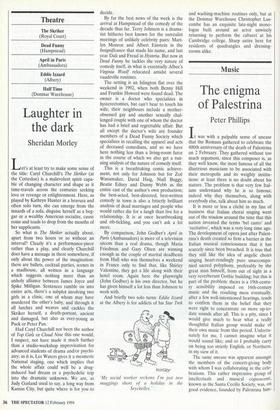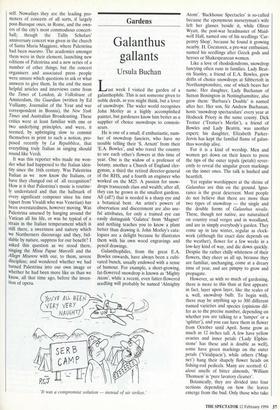Music
The enigma of Palestrina
Peter Phillips
It was with a palpable sense of unease that the Romans gathered to celebrate the 400th anniversary of the death of Palestrina on 2 February. They gathered without too much argument, since this composer is, as they well know, the most famous of all the illustrious musicians to be associated with their metropolis and its weighty institu- tions: at least there is no doubt about his stature. The problem is that very few Ital- ians understand why he is so famous; indeed why they themselves, along with everybody else, talk about him so much.
It is more or less a cliché in my line of business that Italian choral singing went out of the window around the time that this nation invented the terms 'bet canto' and 'recitativo', which was a very long time ago. The development of opera just after Palest- rina's death created so firm a barrier in the Italian musical consciousness that it has scarcely since been breached. It is true that they still like the idea of angelic choirs singing heart-rendingly pure unaccompa- nied sacred polyphony, preferably by the great man himself, from out of sight in a very reverberant Gothic building; but this is part of the problem: theirs is a 19th-centu- ry sensibility imposed on 16th-century music and the resulting mess eventually, after a few well-intentioned hearings, tends to confirm them in the belief that they were right to concentrate on more up-to- date sounds after all. This is a pity, since I would give much to hear what a really thoughtful Italian group would make of their own music from this period. Unfortu- nately for me, I cannot imagine what it would sound like; and so I probably carry on being too strictly English, or Northern, in my view of it.
The same unease was apparent amongst the members of the concert-giving body with whom I was collaborating in the cele- brations. This rather impressive group of intellectuals and musical cognoscenti, known as the Santa Cecilia Society, was, on good evidence, founded by Palestrina him-
self. Nowadays they are the leading pro- moters of concerts of all sorts, if largely post-Baroque ones, in Rome, and the own- ers of the city's most commodious concert- hall; though the Tallis Scholars' anniversary concert was given in the church of Santa Maria Maggiore, where Palestrina had been maestro. The academics amongst them were in their element, launching new editions of Palestrina and a new series of a number of other things; but the concert organisers and associated press people were unsure which questions to ask or what answers to give them. In the end the most helpful articles and interviews came from the Times of London, de Volkskrant of Amsterdam, the Guardian (written by Ed Vulliamy, Journalist of the Year and war correspondent in Bosnia), the New York Times and Australian Broadcasting. These critics were at least familiar with one or two underlying principles, and were, it seemed, by upbringing slow to commit themselves in print to such a notion, pro- posed recently by La Repubblica, that everything truly Italian in singing should sound like Verdi.
It was this reporter who made me won- der what had happened to the Italian iden- tity since the 16th century. Was Palestrina Italian as we now know the Italians, or have they changed out of all recognition? How is it that Palestrina's music is routine- ly understated and that the hallmark of every significant composer since his time (apart from Vivaldi who was Venetian) has been overstatedness, however moving. Was Palestrina unsexed by hanging around the Vatican all his life, or was he typical of a strain in the Italian temperament which is still there, a sweetness and naivety which we Northerners discourage and they, bid- dable by nature, suppress for our benefit? I asked this question as we stood there, singing the Missa Papae Marcelli and the Allegri Miserere with our, to them, severe discipline; and wondered whether we had turned Palestrina into our own image or whether he had been more like us than we know, all that time ago, before the inven- tion of opera.



















































 Previous page
Previous page